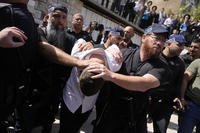Pres. Bush gave a primetime speech tonight on immigration and border security (here's the full text of the speech, and here's the fact sheet on it). A lot of the speech covered familiar ground for those who have followed the immigration and border security debate closely; but he did provide some new specifics on his plan for border security, the most newsworthy element of which is the proposal to deploy up to 6,000 members of the National Guard on the southern border as a stopgap measure. Bush discussed this plan in the context of a proposal to increase the number of Border Patrol agents to 18,000 by the end of 2008, from a current level of 12,000. In essence, this proposal is simply fulfilling existing law in the Intelligence Reform and Terrorist Prevention Act of 2004 which mandated a doubling of the size of the Border Patrol over five years. As a stopgap measure leading up to 2008, Bush would deploy a rotation of 6,000 National Guard troops as a temporary measure, commenting in his speech:
Bush discussed this plan in the context of a proposal to increase the number of Border Patrol agents to 18,000 by the end of 2008, from a current level of 12,000. In essence, this proposal is simply fulfilling existing law in the Intelligence Reform and Terrorist Prevention Act of 2004 which mandated a doubling of the size of the Border Patrol over five years. As a stopgap measure leading up to 2008, Bush would deploy a rotation of 6,000 National Guard troops as a temporary measure, commenting in his speech:
One way to help during this transition is to use the National Guard. So in coordination with governors, up to 6,000 guard members will be deployed to our southern border. The Border Patrol will remain in the lead. The guard will assist the Border Patrol by operating surveillance systems, analyzing intelligence, installing fences and vehicle barriers, building patrol roads, and providing training. Guard units will not be involved in direct law enforcement activities -- that duty will be done by the Border Patrol.
This initial commitment of guard members would last for a period of one year. After that, the number of guard forces will be reduced as new Border Patrol agents and new technologies come online. It is important for Americans to know that we have enough guard forces to win the war on terror, to respond to natural disasters, and to help secure our border.
To paraphrase Bruce Schneier, this idea is "border security theater" - a political proposal designed to grease the legislative skids in Congress, but one that will have little impact on border security, and even worse, is operationally flawed and quite likely to be a costly diversion from other border security priorities. Consider the following questions:
1. How are these Guardsmen going to be trained? Guarding and patrolling the border requires many types of specialized training: language skills, driving skills, legal knowledge, cultural training, etc. The Border Patrol currently spends about $160 million per year on training to develop and maintain its skilled workforce. Members of the National Guard have not been trained in many of these areas, nor will they immediately possess the skills needed to conduct the activities outlined in the speech - intelligence, surveillance - in a domestic context. Does it really make sense to train them, and then throw away all of this knowledge after a year?
2. Where are they going to live? Unlike with Border Patrol agents, the federal government will be responsibility for providing temporary housing for members of the National Guard deployed at the border. How much is this going to cost? (Although on the other hand, perhaps we've just found a use for the 11,000 FEMA trailers that are sitting in Hope, Arkansas).
3. Can they communicate with each other? Do the National Guard units and the Border Patrol have the same types of radios and other communications devices? If not, does that mean that this decision requires a massive new investment in equipment that will have short-term value?
4. How do the Border Patrol and National Guard work together? Can two very different organizations be integrated? What is going to be done to prevent organizational clashes between the National Guard and the Border Patrol? How will questions of decision-making and resource allocation be handled?
Overall, this proposal has all the marks of being costly and ineffective. And this analysis doesn't even cover the issue of the National Guard already being overstretched as a result of the war in Iraq and the Guard's disaster management responsibilities, which is also a concern. If border states want to spend their own money sending their National Guard forces to the border, fine. But the federal government shouldn't pay for it. Instead of wasting money on stopgap measures, we should accelerate the increase in Border Patrol agents, technology investment, or what is probably the best bet strictly from a cost standpoint (although detestable for symbolic reasons), building a complete border fence.
UPDATE 05/16/06 12:45 AM: Below are remarks by Sec. Chertoff last December from an interview with Bill O'Reilly on the idea of sending the National Guard to the border:
Chertoff: Well, the National Guard is really, first of all, not trained for that mission. I mean, the fact of the matter is the border is a special place. There are special challenges that are faced there....
Chertoff: I think it would be a horribly over-expensive and very difficult way to manage this problem.
He was exactly right, and still is.
-- Christian Beckner (crossposted from Homeland Security Watch).
UPDATE 05/17/06 9:52 AM: Here's a handy stat, courtesy of the National Security Round Table: 6,000 guardsmen "comes out to one soldier for every mile of border broken down into three 8 hour shifts."








